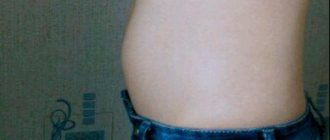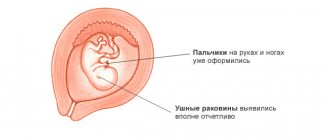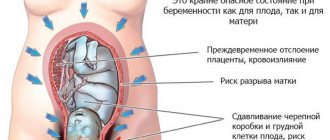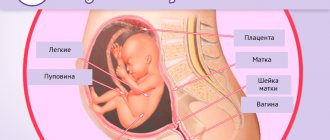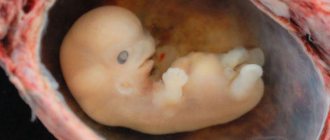- November 22, 2018
- Pregnancy
- Angelina Simakova
In this article we will figure out what it means if the lower abdomen hurts at 22 weeks of pregnancy. This is already a little more than halfway through pregnancy. At this stage, the woman is no longer bothered by toxicosis, loss of appetite, and the stomach is not yet so large as to impair movement. During this period, the child begins to actively grow, and in connection with this, a woman may experience various unusual conditions, sometimes not entirely pleasant, however, if the pregnancy proceeds without pathologies, such pain in the abdominal area is the norm for this period.
The category of unpleasant sensations at the 22nd week includes:
- slight nagging pain in the abdomen;
- swelling;
- back pain;
- phlebeurysm;
- headache.
Feel
If your lower abdomen hurts at 22 weeks of pregnancy, don’t be alarmed. The uterus of the expectant mother begins the process of preparing for the upcoming birth. Sometimes such pain resembles discomfort during menstruation. The main causes of aching pain in the lower abdomen that do not require treatment are:
- hormonal changes in the body;
- increased blood flow in the pelvic vessels;
- tension of the uterine ligaments as a result of the rapid increase in size of this organ;
- physiological loosening of the cartilage and ligaments of the symphysis pubis and their separation;
- pressure of the baby's head on the bottom of the pelvis and his motor activity.
If the pain is prolonged and severe or is accompanied by watery or bloody discharge, then in such a case it is necessary to urgently contact an obstetrician-gynecologist.
Changes in the body
In order to respond correctly to various sensations, you need to know what happens at 22 weeks of pregnancy. First of all, at this time there is a significant increase in the size of the uterus. It rises approximately a couple of centimeters above the navel. This causes some problems due to the pressure of the uterus:
- On the diaphragm - there are difficulties with inhalation and exhalation.
- On the organs of the gastrointestinal tract - digestion in general is disrupted and constipation occurs.
The 22nd obstetric week of pregnancy is characterized by the appearance of false contractions. Contractions of the uterus are painless and they do not pose a threat to pregnancy, but are merely preparation for the upcoming birth. It is dangerous if the ongoing process is accompanied by pain; often such a symptom foreshadows the onset of premature labor. In this case, the child can only be saved in a hospital setting.
At the 22nd week of pregnancy, the development of the child continues and the female body requires more strength. In particular, to increase the supply of oxygen to the baby’s organs and systems, the woman’s circulating blood volume increases. As a result, anemia may develop, so you need to take care of additional iron intake into the body.
Pain and discharge
A woman begins to weigh more this week. therefore, the load on the spine increases. There is a shift in the center of gravity, which provokes pain in the back.
Often pregnancy at 22 weeks is associated with the fact that after a long stay in an upright position, the lower back begins to hurt. Special unloading exercises help combat pain in the back. In addition, to prevent the occurrence of pain, you must follow the following rules:
- Wear comfortable shoes without heels.
- When sitting down on a chair, raise your legs a little using a special stand.
- After every hour spent in a sitting position, you need to walk or perform a set of special exercises.

Very often, the 22nd week of pregnancy is associated with the development of hemorrhoids, which is accompanied by painful sensations. This pathology develops against the background of the fact that, as the uterus increases in size, it compresses the vessels, which disrupts the outflow of blood in the pelvic area. Hemorrhoids almost always occur at 22 weeks of pregnancy with twins. To relieve pain, in agreement with the doctor, the use of special suppositories is allowed.
Pain in the lower abdomen is always a dangerous symptom. They may be a harbinger of premature birth. Additional threatening symptoms are spotting at 22 weeks of pregnancy and leakage of amniotic fluid.
Moderate milky discharge with a sour odor is considered normal at week 22. Any change in their consistency and color indicates infection of the genital tract. In this case, you need to undergo tests to establish a diagnosis and undergo a course of treatment recommended by the doctor.
Causes
So, let’s figure out why the lower abdomen hurts at 22 weeks of pregnancy. This happens very often. This is due to the rapidly growing uterus, and during such growth the abdominal muscles also stretch. Not every woman’s body is adapted to such changes. During the period of active growth of the abdomen, pain may be felt. Such sensations arise not in the abdomen itself, but in the ligaments and muscles, and it is almost impossible to eliminate such a symptom. However, the pain goes away around the 28th week, and is replaced by other, no less painful sensations.
Why does my stomach still hurt at 22 weeks of pregnancy?
A woman may have stomach pain, which is explained by the pressure of the uterus on its lower part. Approximately the same situation occurs with the intestines, liver and bladder. As the abdomen enlarges, pressure on the bladder causes pain below and frequent urination.
Dangers
The main danger at week 22 is secondary toxicosis. This pathological condition is caused not by hormonal changes, but by an exacerbation of various diseases of the cardiovascular or endocrine system.
Late toxicosis is dangerous; it poses a threat to the fetus and pregnancy as a whole, therefore, in most cases, the woman is hospitalized and is under strict medical supervision. Other dangers for pregnancy at 22 weeks include the following pathologies:
- Anemia, which occurs due to an increase in the amount of blood pumped.
- Problems with the kidneys, which lead to edema and deterioration of the woman’s general condition.

- Diabetes mellitus in pregnant women, which can cause pathologies in the child.
- Oligohydramnios, which can cause fetal hypotrophy and problems during childbirth.
- Hypertonicity of the uterus, which poses a threat to pregnancy.
The 22nd week of pregnancy is a very important period when a woman needs to take very good care of herself in order to successfully bear the fruit and give birth to a healthy baby. In the normal course of pregnancy, sex is allowed at the 22nd week of pregnancy, especially since it is at this time that a woman’s sensitivity increases significantly against the background of good health. But, if during sexual intercourse there is minor pain in the lower abdomen, then you should definitely consult a doctor to find out its cause.
At week 22 there is always rapid weight gain. To prevent exceeding the norm, it is necessary to control the diet. It is important to ensure that a woman’s body receives all the necessary substances with food for the full development of the fetus, but on the other hand, it is necessary to reduce the calorie content of the food consumed as much as possible. To minimize the risk of diabetes in pregnant women, you should limit your consumption of sweets and flour products.
It must be remembered that a positive attitude has a beneficial effect on the development of the baby. During this period, the support and understanding of loved ones is especially important for a woman. At the 22nd week of pregnancy, you need to control your emotional state, strive to enjoy life and avoid heavy physical activity.
Discomfort on the left side
If at 22 weeks of pregnancy the left lower abdomen hurts, this may be due to pressure on the spleen and some parts of the intestines. This is also normal and does not require treatment. As the abdominal structures adapt to the growing fetus, such pain goes away on its own.
Sometimes at 22 weeks of pregnancy the lower abdomen hurts when walking. This is also a natural phenomenon at this time. And the reason for it is the increasing load on the ligamentous apparatus of the pelvis and hip joints. This is precisely why at 22 weeks of pregnancy the lower abdomen hurts when changing position.
Sensations - what happens in the body of a pregnant woman
During this period of pregnancy, you may experience back and lumbar pain. This is explained by a shift in the center of gravity due to a growing belly, and the appearance of serious loads that fall on the lower back and spine.
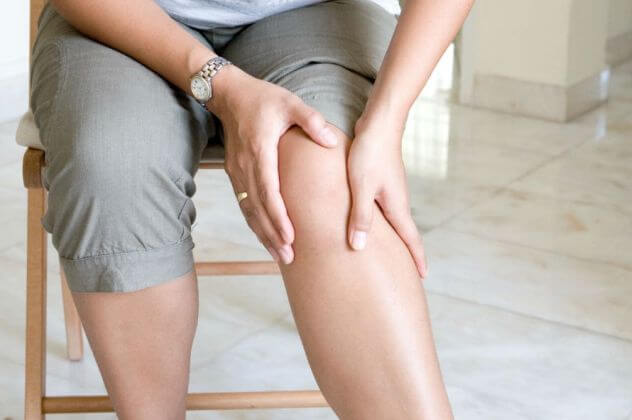
Our simple recommendations will help you reduce this pain:
- Be sure to wear a special bandage that supports your stomach and back and reduces the load on them.
- Learn to unload your spine during the day, for which you need to take a horizontal position more often.
- Perform special gymnastics for pregnant women, which also includes exercises for the back.
Sometimes lumbar pain at this stage of pregnancy can be an alarming symptom:
- Prolonged pain in the lumbar region may indicate the presence of pyelonephritis, or urolithiasis. In this case, you will need to consult a doctor.
- The appearance of nagging lumbar pain accompanied by aching abdominal pain may indicate increased uterine tone. Such painful sensations also require your close attention!
By the middle of pregnancy, hemorrhoids may also make themselves felt. This is a common problem in pregnant women and a painful topic for many expectant mothers.
The cause of hemorrhoids is a violation of the outflow of blood in the pelvic region and a deterioration in intestinal motility, compressed by the enlarged uterus.
Recommendations for preventing hemorrhoids if you are 22 weeks pregnant:
- nutrition should be correct - eat foods high in fiber,
- If hemorrhoids occur, consult your doctor about the use of rectal suppositories.
What to do?
Getting rid of abdominal pain at 22 weeks is quite difficult. Experts recommend that pregnant women get more rest. In fact, in a supine position the pain noticeably subsides, and may even disappear altogether. On the other hand, in order for the muscles to adapt faster, it is recommended to engage in light sports. And walking is especially important. It is very important to combine sports and rest so that abdominal pain in the 22nd week does not bother you so often.
You should not take painkillers during pregnancy, as they can cause serious harm to the unborn child. If the pain becomes very severe and difficult to endure, then this is already a pathological symptom that requires consultation and examination by a doctor. It is possible that the cause of pain in the lower abdomen or another part of it does not lie in sprained ligaments and muscles.
Recommended lifestyle for a pregnant woman
What should a woman do and how should she behave at 22 weeks of pregnancy from conception?
Doctors give several recommendations that relate to different areas of a pregnant woman’s life.
Buying a bandage
Even if there are no significant difficulties at this time, now is the time to stock up on a bandage. An elastic belt will help support the uterus and baby in the correct position, while reducing the pressure that the uterus puts on surrounding organs and reducing the strain on the back.
The bandage is especially recommended for those who spend most of their time on their feet. If the pregnancy is repeated, multiple, or the woman is overweight or has problems with the kidneys and spine, wearing a support belt is mandatory.
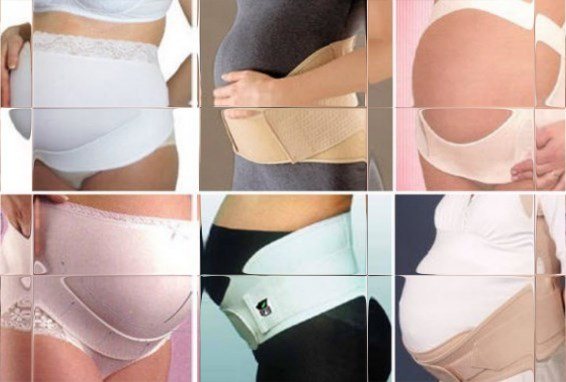
Nutrition
The diet of the expectant mother during this period should be varied and rational. Under no circumstances should you overeat, but going on any diet is contraindicated.
At this time, it is best to exclude mushrooms from the menu. Due to the fact that they, like a sponge, absorb everything, they often contain toxic substances that can negatively affect the fetus.
It is also not recommended to use:
- poorly cooked meat;
- unprocessed milk;
- raw eggs;
- fast food and dubious semi-finished products.
All these products may contain microorganisms that are unsafe for a pregnant woman and child.
In addition, it is recommended to exclude or minimize the consumption of baked goods, sweets, cakes, colored carbonated drinks, and sauces, as they contribute to excess weight gain. Obesity, in turn, can cause various complications during pregnancy.
To avoid unwanted reactions of the body, you should not try new foods, or eat out-of-season greens.
At the same time, the diet must include fish, seafood and food rich in beneficial vitamins and minerals. Particularly important:
- dairy products, nuts and oatmeal (contain Ca);
- citrus and sour berries (vitamin C);
- yellow vegetables and fruits (vitamin A);
- red meat (or organ meats), lentils, spinach (contain a lot of Fe).
Important! With a proper and varied diet, there is usually no need to take additional vitamin complexes.
Sex
During this period, the reason for prohibiting intimacy may be:
- threat of miscarriage;
- low placentation;
- cervical weakness;
- increased tone and some other factors.
In the absence of these factors and prohibitions on the part of the doctor observing the pregnancy, there are no contraindications for sexual intercourse.
Sport
If a woman is healthy and no deviations in the course of pregnancy are observed, then there are no special restrictions for physical activity. At this stage, gymnastics and exercises that help open the hip joints and strengthen the muscles of the perineum are useful.
The main thing is to listen to your feelings. If after training it is not possible to return to a normal state for a long time, then it is necessary to reduce the load or replace complex exercises with easier ones.
Walking in the fresh air will be of great benefit.
Trips
If there is a need to go somewhere, then it is better to prefer a train, where you can walk and lie down. Long-distance buses, in which you need to sit for a long time, are no longer suitable for traveling for such a period.
However, like airplanes, it is unknown how a change in pressure will affect the fetus and the condition of the pregnant woman herself.
But no matter what method of transportation you ultimately choose, you must take with you an exchange card, sedatives and antispasmodics, and a blood pressure monitor.
Training contractions
If the lower abdomen hurts at 22 weeks of pregnancy, this may mean periodic training (false) contractions. In most cases, in women who have given birth before, they are observed only before childbirth. For those who are pregnant for the first time, false contractions are observed much earlier - right from about 22-24 weeks. Training contractions do not pose any danger to pregnancy. Their purpose during this period is still unknown to science, but obstetricians believe that these contractions (doctors also call them Braxton-Hicks contractions) are manifestations of the preparatory stage preceding childbirth. However, false contractions are not their harbingers, since they do not contribute to the development of effacement and dilatation of the uterine cervix.
Training or false contractions are a sharp contraction of the smooth muscles of the uterus. They manifest themselves as severe tension in the uterine area and lower back pain. Such contractions may resemble female sensations during menstruation, cramps. At week 22, training contractions are usually irregular in nature and pass quickly after resting or taking a shower. If a woman feels such abdominal pain constantly and for a long time, this can be quite an alarming signal, and it is worth seeking medical help.
Treatment for the development of training contractions, as a rule, is not prescribed. However, they must be differentiated from such a pathological phenomenon in pregnant women as uterine hypertonicity.
Fetus at 22 weeks of gestation: movements, development, weight and size
And now this “adaptability” is manifested in persistent pushing and prodding of the baby from inside the mother’s tummy. His movements become more and more obvious and distinct. There is still plenty of room for the baby to move in the uterus, so he swims from wall to wall, pushing off with his arms and legs, rests his limbs on his mother’s tummy, tumbles...
The baby now reacts to both loud sounds and excessively bright lighting. Frightened by an unexpected scream or loud music turned on, the baby may communicate his fear with a push. In general, during the day the baby makes a couple of hundred movements, however, most of them go unnoticed by the mother.
You should definitely pay special attention to the nature and frequency of movements. True, you shouldn’t be fanatically zealous and listen to yourself every second: the main thing is to record the baby’s movements in the morning and evening hours.
Please note that the frequency of movements may also indicate certain inconveniences experienced by the baby. So, excessively frequent movements may indicate, say, insufficient oxygen supply to the fetus. The absence of movements during the day also becomes an alarming sign, with which you should definitely go to see a doctor.
After all, in fact, the baby is now moving a lot - there is still enough space, although he continues to grow: at the 22nd week of pregnancy, the fetus weighs on average 430 g and has a height of 27.8 cm.
At this stage, the intense brain growth at this point slows down somewhat. The sweat glands and the area of tactile sensations enter the stage of active development. The baby explores herself and the environment by touch: she strokes her face, grabs everything she can reach with her hands, and knocks on the wall of the uterus. Thumb sucking became his favorite pastime. Now the baby can confidently not only bring his hand to his mouth, but also, if such a desire arises, tilt his head towards the finger, leaning forward. You can already feel its activity. Listen to every movement - this is not only pleasant, but also informative: often this is how the baby gives you a signal of her dissatisfaction or request (change her body position, go out into the fresh air, calm down or calm him down). A complete cessation of movement for more than 24 hours should alert you.
Future mom
Communication with the baby is very, very important. Talk to him, consult with him, share secrets - he is so soothed by the voice of his mother! Always remember that he feels your mood and experiences all emotions with you. Also learn to capture his mood, feel and study his sleep and wakefulness patterns. In moments of anxiety, try to calm Masik down - sing him a song, stroke his tummy. Some scientific studies show that from this period the fetus not only feels you, but also understands you perfectly.
Meanwhile, do not forget about physiology: it is important to walk correctly, stand correctly, sit and lie correctly - everything matters. The load on the spine and lower back is constantly increasing, you feel more and more the heaviness of the “load”, fatigue in your legs, swelling and other complications may have already appeared. Do not cross your legs; try to raise your legs a little higher than usual while resting. You need to sit and lie on hard, flat surfaces, without falling into a chair or mattress.
If your legs begin to get more tired and your feet no longer fit in your old shoes, buy yourself another one, a larger one. Walking comfort is very important now. Of course, the legs must breathe, so no rubber or leatherette! It would be good if there was an orthopedic insole inside. If it's winter, be sure to check that your shoes are non-slip.
With each subsequent week, your weight will increase, and your health may worsen somewhat. So hurry up to enjoy life now: relax, take a walk, go to nature with your beloved husband, have sex if you have no contraindications to this.
But keep in mind that in the second trimester the level of hemoglobin in the blood often drops: if you feel unwell, lie down, sit down, ask for help in a public place.
More on the topic
Symptoms of uterine tone during pregnancy
Contraction of the uterus during pregnancy
Abdominal pain during pregnancy
Pain in the lower abdomen during pregnancy
32 weeks pregnant
Pain with abnormalities
At the 22nd week of pregnancy, the lower abdomen hurts, both during menstruation and for other reasons that pose some danger to the unborn child and mother. The main reason for their occurrence may be the threat of premature birth. The child at this stage of gestation has already reached approximately 28 cm in length and has a body weight of 400 grams. However, during this period it is unlikely that he will be able to survive outside the mother’s womb. Despite this, there are cases where babies born at 22 weeks survived thanks to the efficiency and professionalism of experienced specialists. But such cases are very rare, therefore, if a woman experiences pain, and this process is accompanied by bloody discharge from the genital tract, it is necessary to urgently go to the hospital.
Why does the stomach hurt during pregnancy at 22 weeks is interesting to many. This may be due to digestive problems. Constipation, diarrhea and bloating are the very first signs of problems in the digestive tract. If this happens to a woman constantly, then she needs qualified medical care.
When your lower back hurts at 22 weeks of pregnancy, this may indicate kidney disease. Symptoms of this pathology can be characterized by rare or frequent urination, dark urine with a strong odor and severe pain in the side. When you have a flu or cold, your stomach may also hurt.
Pain
The leading position in the list of “pain at 22 weeks of pregnancy” is occupied by back pain, primarily in the lumbar region. This is not surprising: by this time, the center of gravity has shifted due to the constant increase in the abdomen, and serious loads are now placed on the spine and lower back. You can avoid pain, or at least reduce it, with the help of simple rules. Firstly, wearing a special bandage that supports the back and abdomen, somewhat relieving the load. Secondly, be sure to unload your spine during the day by taking a horizontal position. Gymnastics for pregnant women, including exercises for the back, will be a good help.
However, do not forget that lower back pain can also be a slightly more alarming symptom. If lower back pain is prolonged and causes significant discomfort to a woman, it would be a good idea to consult a doctor about this to rule out the presence of urolithiasis or pyelonephritis. Nagging pain in the lower back, combined with the same pain in the abdomen, is one of the likely symptoms of increased uterine tone. Therefore, such pain should not be ignored either.
My legs are now getting more and more tired, and in the evenings I may experience a feeling of heaviness and burning. This is also the consequence of an increasingly increasing load on the legs as the pregnant woman’s body weight increases.
Unpleasant painful sensations are accompanied by hemorrhoids, which often make themselves felt by the middle of pregnancy. Hemorrhoids are a very common problem among expectant mothers, which manifests itself as a consequence of worsening peristalsis of the intestines compressed by the uterus and impaired blood flow in the pelvic area. Recommendations in case of manifestations of hemorrhoids are always the same: proper nutrition, including foods with a high fiber content, and, if necessary, the use of special rectal suppositories agreed with the doctor.
Why might a miscarriage occur?
At 22 weeks, the possibility of spontaneous miscarriage remains, but this risk is already minimal. During this period, intrauterine fetal death occurs much more often. And pain at 22 weeks can be a warning to a woman that not everything is all right with the baby.
What are the reasons for this phenomenon at the 22nd week of pregnancy? If the patient’s uterus is not able to withstand heavy loads, then with the active growth of the fetus, her cervix begins to spontaneously open and a miscarriage occurs. Doctors call this premature birth, since the child in this situation is born alive, but he is not capable of independent life. Those patients who, if abdominal pain occurs at the 22nd week, consult a doctor without delay, have a high chance of maintaining pregnancy.
About the height and weight of the fetus
Your baby has already grown incredibly, and at 22 weeks of pregnancy the weight of the fetus is on average about 430 g, and its height at this stage reaches 28 cm.
- During this period, communication with the baby becomes extremely important. Talk to him, sing songs to him, because now his mommy’s voice soothes him very much! Remember that the child already feels the mood well, experiencing all your emotions with you. Try to surround yourself with things and events that bring only positive emotions. By the way, many mothers really like to take a photo of their belly as a souvenir at 22 weeks of pregnancy.
- At the same time, we should not forget about the physiology of a pregnant woman. It is important to be able to walk and stand correctly, to learn to sit or lie down correctly.
- Now you should not cross your legs; while resting, raise your legs a little higher. A woman should sit and lie down on hard, flat surfaces.
- If your feet are swollen and your legs are more tired than usual, change your shoes to more comfortable ones.
- Further, with each passing week, your weight will increase, but your health may worsen.
While you have the opportunity, just try to enjoy life! Rest more, walk in the fresh air, listen to pleasant music, have sex with your favorite person, if this is not contraindicated for you.
During the second trimester, the level of hemoglobin in the blood of a pregnant woman may drop. If you feel weak and unwell, it is better to sit down or lie down and rest.
Causes of intrauterine fetal death
In addition, it is necessary to indicate the causes of intrauterine fetal death, which may also cause pain. These include:
- An infectious inflammatory process that usually occurs with pathologies such as rubella, herpes, toxoplasmosis and cytomegalovirus. Some sexually transmitted infections are also of great importance - chlamydia, gonococci and others. Sometimes a common cold can cause pregnancy failure at the 22nd week.
- Genetic disorders and chromosomal abnormalities. If an embryo inherits an extra chromosome or a damaged gene, development occurs incorrectly - defects are formed that are incompatible with life. In such a situation, stopping the development of pregnancy is a protective mechanism provided by nature.
- Hormonal dysfunction.
- An autoimmune pathology in which antibodies are produced to destroy one’s own cells. Such antibodies attack the cells of the embryo, as a result of which the pregnancy stops.
- Indirect factors, which include injuries, infection, unhealthy lifestyle, alcohol abuse, etc.
What to do if at 22 weeks of pregnancy the lower abdomen hurts on the right or left?
Problems in the twenty-second week of pregnancy
This week is still quiet for the most part. Some discomfort caused by the growing uterus is not yet significant. Many women feel very tired at the end of the day, while others, on the contrary, feel a surge of strength. Every pregnancy is unique, but usually women have the classic set of problems that accompany a healthy pregnancy.
Nausea at 22 weeks of pregnancy

It is extremely rare that morning sickness continues to plague a pregnant woman by the due date. But it happens that this condition does not weaken until childbirth. This situation is more the exception than the rule.
- Most often, nausea in the middle of the second trimester can be caused by food poisoning or stomach diseases. If an unpleasant condition accompanies you for a long time, visit a gastroenterologist.
- Mild nausea is a consequence of low blood pressure, which is typical for this period. In this case, lie down, rest, eat a square of dark chocolate, drink water.
- Sudden nausea and even vomiting can occur due to a sharp rise in blood pressure. This condition cannot be ignored, since this is how gestosis manifests itself.
Preeclampsia
This is the common name for complex dysfunction of vital organs.
The work of the circulatory system is most often affected, which manifests itself:
- increased blood pressure;
- changes in blood viscosity;
- imbalance of electrolytes.
As a result, the functioning of organs (liver, kidneys) and blood supply to the fetus are disrupted.
A characteristic sign of gestosis is the detection of protein in the urine. Weakness, spots in the eyes, fatigue, swelling, pain in the chest and stomach area are also observed. Severe forms of gestosis are called preeclampsia and eclampsia. These conditions pose a real threat to the mother and fetus. That is why it is so important to prevent their development at the first signs of late toxicosis.
The reasons for this condition have not yet been reliably elucidated.
It is believed that it can be provoked by:
- stress;
- overweight;
- heredity;
- hormonal disbalance;
- age of the pregnant woman, etc.
Due to a lack of understanding of the provoking factors, there are no effective measures to prevent preeclampsia.
Diarrhea and constipation
Digestive problems affect every pregnant woman to one degree or another. Constipation during pregnancy is a physiological condition. The hormone progesterone, which relaxes the muscles of the uterus and at the same time the intestines, is to blame for this. The increasingly cramped conditions do not make the work of the digestive tract easier.
It is imperative to solve this problem so that constipation does not become habitual.
- Start by revising your diet to include more fiber and water. Oils are not the best choice, especially “exotic” ones. For example, flaxseed is strictly prohibited for pregnant women.
- If you have no contraindications, exercise moderately or walk on a treadmill. The flow of blood to the organs will improve peristalsis naturally.
- You should not resort to laxatives. Their principle of action is aimed at activating peristalsis, which is undesirable for the uterus. A pregnant woman can only take lactulose preparations, but do not expect an immediate effect from them. Microenemas can also be used as an emergency remedy.
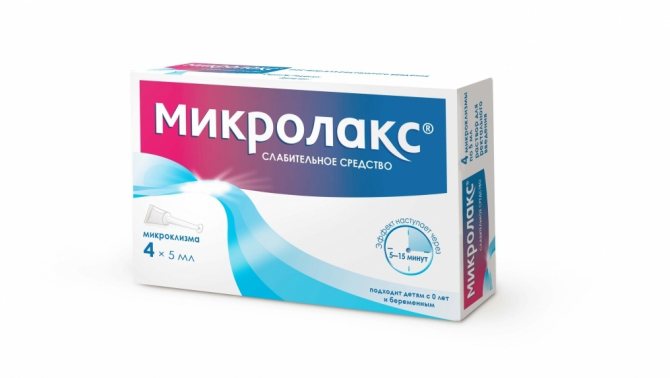
Iron supplements, which are often taken by pregnant women to prevent anemia, can also cause constipation. To avoid this, supply iron through food rather than synthetic dietary supplements.
Diarrhea is directly associated with pregnancy in two cases:
- As one of the symptoms of toxicosis at the beginning of gestation.
- How to prepare the body for childbirth.
In the second trimester, frequent loose stools are usually due to the same reasons as in any non-pregnant woman:
- food poisoning;
- infections (dysentery, etc.);
- errors in nutrition;
- nervous tension.
Treatment in each case is selected separately. Diarrhea, accompanied by fever and symptoms of general intoxication, is especially dangerous. Stools mixed with blood, mucus, foam, or colored black are also suspicious.
Heartburn
Chest pain and burning are typical signs of heartburn. It is useless to treat this condition during pregnancy, but you can learn to stop its manifestations. For this:
- eat often, but little by little;
- do not take a horizontal position after eating;
- exclude fried, fatty foods;
- add a couple of extra pillows to your bed.
If heartburn occurs, drink milk or mineral water, such as Borjomi. It’s good to eat something neutral - broth, a crust of bread, porridge. Pregnant women are allowed to take antacids (Renny, etc.).
Stomach hurts and pulls
In addition to the already familiar painful sensations caused by sprained ligaments, at this stage a new pain factor appears in the pregnant woman. As the baby grows, his kicks become more and more noticeable. And the further you go, the more difficult it is to call them pleasant. With a cephalic presentation, the baby is positioned with his legs up and kicks the nearest organs, like a real football player. In the meantime, all organs get a little, which causes moderate pain.
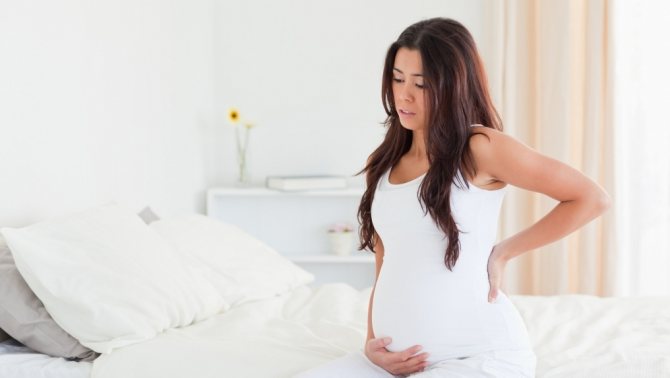
Nagging pain is usually caused by stretched ligaments or appendages due to blood flowing to them. The feeling of a “stony” uterus that occurs as a result of prolonged physical activity or for other reasons is also not very pleasant. These pains are not dangerous and usually go away if you give yourself time to rest and relax.
But, besides this, pain in the abdomen at 22 weeks of pregnancy is caused by:
- problems with the intestines, compressed by the uterus;
- flatulence caused by poor nutrition;
- inflammatory processes in the digestive tract;
- spontaneous abortion that has begun.
To relieve pain in the intestines, you can take No-shpa or antifoam drugs, for example, Espumisan. In the last two cases, an urgent visit to the hospital is mandatory.

Bleeding at 22 weeks of pregnancy
The most threatening symptom that can occur during pregnancy is bleeding. Postponing a trip to the hospital is strictly contraindicated. Most processes can be stopped with the help of medications, but only at the very beginning.
Bleeding is most dangerous in the early stages or at the end of the last trimester. But even this week, conditions that threaten the life of the embryo may arise. Among them:
- placental abruption (internal bleeding occurs, and then external bleeding);
- uterine rupture due to polyhydramnios or the presence of pathologies, scars;
- placenta previa.
Any of these conditions will not disappear on their own, so there is no point in trying to “lie down” on the couch. Even if the bleeding is not accompanied by pain, this is not a reason to ignore it.
Premature birth
In the current, 22nd obstetric week (20th from conception), the likelihood of the baby being delivered in the event of premature birth is still extremely low. However, if the fruit is large enough (about 0.5 kg), then there is still a chance, but it is expensive and no one gives any guarantees.
Premature birth occurs in exactly the same way as normal labor. They begin with rare contractions that gradually increase. This process proceeds slowly in the second trimester due to weak labor and low weight of the child. The hospital will definitely try to stop the birth. Then, they will try to find out their cause and eliminate it.
The most common prerequisites for premature birth are:
- infections;
- shortening of the cervix;
- hormonal imbalances;
- nervous exhaustion;
- any acute illnesses in the mother.
The severity of premature babies is measured in stages and the fourth, the most difficult, begins at the 31st week. Then the child weighs approximately a kilogram and already has a real chance of survival. In the meantime, premature birth usually ends in fetal death.
Frozen pregnancy at 22 weeks
Unfortunately, the fetus can die at any stage of gestation and it is impossible to insure against this. The cause is infection, genetic abnormality, physical impact and many other factors. It is impossible to turn back time, therefore, having diagnosed fetal death, the only thing a doctor can do is to eliminate threats to the mother’s life.
A woman can assume that her pregnancy is fading due to several signs:
- lack of movement;
- “collapse” of the breast;
- general malaise, temperature;
- symptoms of severe intoxication.
The death of the fetus may be followed by an abortion, but sometimes this process is delayed and then labor stimulation is required. After such a procedure, the rehabilitation period before the next conception should be at least six months.
Colds, ARVI and flu. Temperature increase. Can I take antibiotics?

In the middle of the current trimester, the expectant mother can already be treated with many medications, supplementing therapy with folk remedies. It is better not to delay therapy, so that you do not have to be treated later with drugs that are dangerous to the fetus. At the period under discussion, pregnant women already have a wide range of approved medications (anti-cough, anti-fever, for treating the runny nose and strengthening the immune system). In case of a bacterial infection, the doctor can already select safe antibiotics.
Self-medication is also unacceptable. Always remember that unfavorable factors can lead to premature birth, and improper treatment can lead to developmental pathology in the fetus.
Food poisoning - what to do?
Poisoning, as a rule, does not pose a threat to the fetus, but it exhausts the mother. Severe poisoning becomes dangerous, leading to dehydration of the mother's body. This shows up:
- dry mouth;
- lack of urge to urinate;
- drying out of the skin and mucous membranes.
If your mother experiences such symptoms, it is better not to risk it and go to the hospital. Food poisoning from mushrooms or chemicals also requires hospitalization.
In the meantime, poisoning does not cause concern; treatment can be carried out at home with the help of sorbents and plenty of sweet drinks.
Toxoplasmosis at 22 weeks
Toxoplasmosis is one of the diseases that can harm a completely healthy child at any stage of pregnancy. The causative agent is a single-celled parasite that enters the mother’s body from dirty hands or plant foods, as well as through the feces of pets.
Most women who communicate with cats suffered from toxoplasmosis in their youth. Antibodies to the infection are detected when tested for TORCH infections. When the expectant mother does not have immunity to the disease, she should be especially careful about personal hygiene and get tested at least once more before giving birth.
Such precautions are explained by the high risk of developing pathologies in an infected fetus. In the second trimester, the disease is most insidious, since it is unknown what pathology and severity the baby may develop. Later, toxoplasmosis is no longer so dangerous, but for now it is better to protect yourself and your future little man as much as possible.
Low placentation (low placenta)
This is the name for abnormal attachment of the placenta, which can cause bleeding and complicate the course of labor. Often placenta previa precludes natural delivery. Complications occur in 15% of cases, otherwise pregnancy and childbirth proceed well.
Risk factors are:
- chronic inflammation in the genitals;
- congenital pathologies of the uterus;
- history of surgical interventions on the uterus;
- elderly age of the pregnant woman;
- presence of abortions.
At this stage, low placentation is already a diagnosis. If before this there was a possibility that with the growth of the uterus the placenta would rise slightly, now this is excluded. A complication of low placental attachment is usually its abruption. The main symptom of this condition is bleeding or slight bruising (depending on the area of the detachment). It usually occurs after physical activity.
Short cervix
This condition is called isthmic-cervical insufficiency in medical circles. The danger of this pathology is that the cervix is weak and cannot withstand the pressure of a growing fetus. As a result, it opens, which provokes premature birth.
The pathology is quite common, but with timely diagnosis it is not dangerous. Most often, a pregnant woman is given several stitches to keep the uterus closed, which are removed before giving birth.
To eliminate risks, you should regularly undergo routine examinations with a gynecologist and do not skip an ultrasound.
Thickening of the placenta
This condition is commonly called hyperplasia. Most often it is caused by hemolytic disease of the baby or a number of other problems. Among them:
- critically low hemoglobin level;
- diabetes;
- gestosis;
- TORCH infections;
- other acute infectious diseases.
This pathology is dangerous due to placental dysfunction, which causes oxygen starvation of the fetus, developmental delays, disruption of homeostasis, and even pregnancy failure or intrauterine death of the fetus.
Despite significant threats, hyperplasia can be treated with medication. The method of therapy is determined based on the causes of the pathology.
Recommendations
If your stomach feels tight at this time, then you need to look for the cause. In the absence of dangerous symptoms indicating a possible miscarriage (strange discharge, bleeding, uterine contractions), we can talk about muscle strain. In this situation, the woman is recommended to rest.
It is also recommended at this time to reduce physical activity, which can cause abdominal pain. This applies to household chores and work. If a woman does not have the opportunity to stop working, she can switch to a shorter working day.
In addition, a short rest is necessary every 30 minutes. You should sleep at least two hours during the day. And, of course, a woman’s nutrition at 22 weeks of gestation requires special attention. Lack of fiber and poor quality foods lead to constipation, which is reflected in the form of abdominal pain.
Belly at 22 weeks
Abdominal pain at this stage is not a very good symptom.
If a pregnant woman experiences a feeling of aching and pulling in her abdomen, she should immediately consult a doctor. Such pain can also occur due to digestive disorders, but most often they are a sign of increased uterine tone. With hypertonicity of the uterus, abundant vaginal discharge may be observed, amniotic fluid may leak, and blood may appear in the discharge.
At the same time, at this stage of pregnancy, a woman may experience her first training contractions (Braxton-Higgins). Such contractions are characterized by a feeling of light uterine contractions and are not accompanied by pain.
If training contractions become regular, abdominal pain appears when the uterus contracts, and amniotic fluid leaks, you need to urgently call an ambulance. A similar picture may indicate the onset of premature labor.
Discharge
Discharge at 22 weeks of pregnancy remains moderate, light or light gray, with a slight sour odor. If the discharge changes color towards green-gray or yellow, flakes, clots of mucus or pus appear in the discharge, the discharge turns into a curdled mass and acquires an unpleasant odor - do not delay going to the doctor. This picture indicates the addition of a sexually transmitted infection, which should be treated as soon as possible. The appearance of bloody discharge at 22 weeks of pregnancy requires an immediate response. Separation of blood from the genital tract is an unfavorable symptom in any case. So, spotting may indicate a premature onset of labor; usually, abdominal pain or the presence of regular contractions will also indicate it. The appearance of blood may also be associated with abruption or placenta previa - doctors classify both phenomena as critical and, if present, insist that the pregnant woman be hospitalized. You should immediately seek medical help if watery, clear discharge appears in increased quantities. Significant transparent watery discharge is evidence of leakage of amniotic fluid. By the way, water can leak in small quantities, in moderate portions, still creating the effect of “wet panties.” But even then, a doctor’s consultation is necessary: violation of the integrity of the membranes is dangerous due to intrauterine infection of the fetus.



